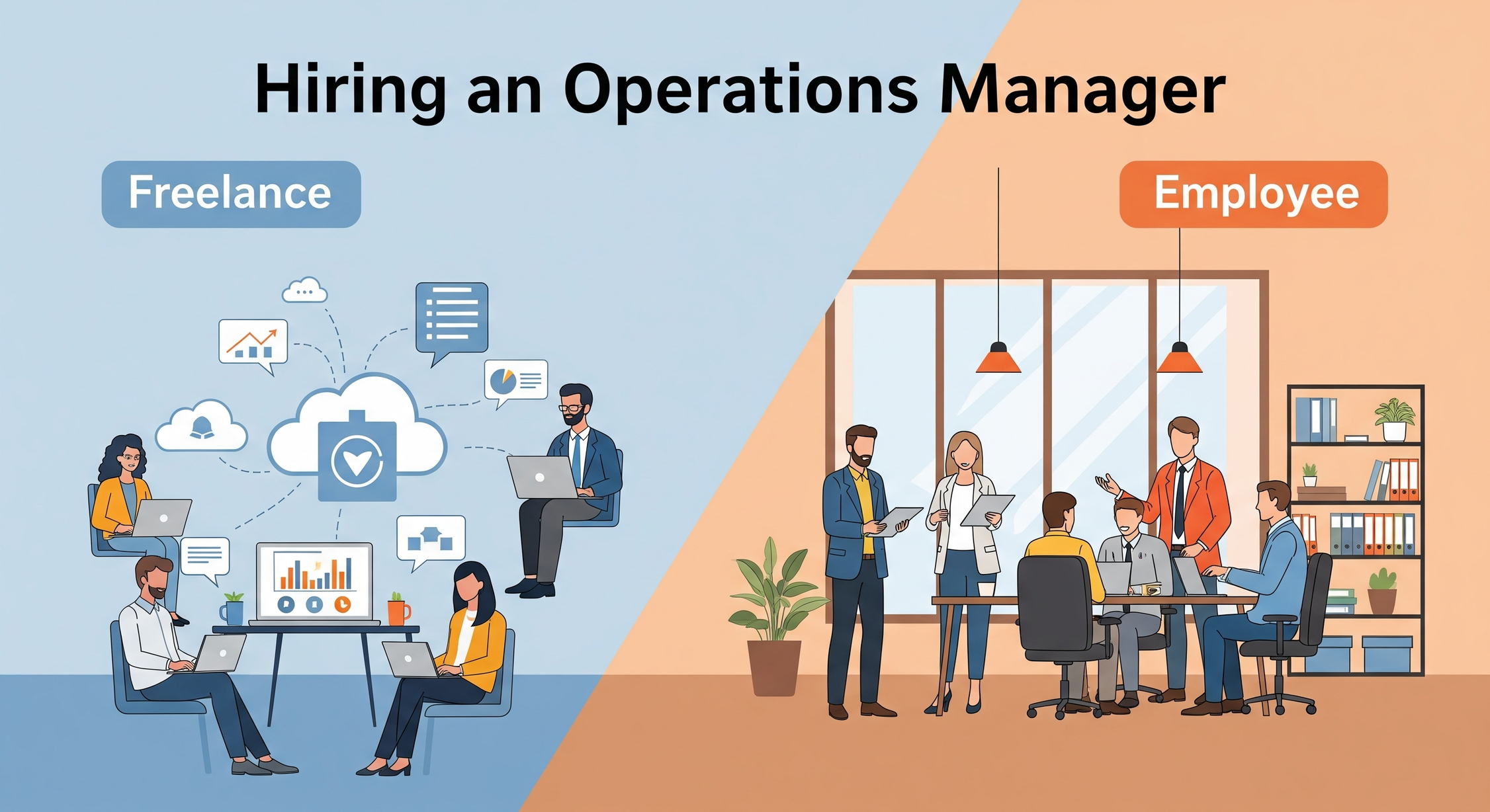|
Employee |
Freelancer (or Fractional/Consultant) |
|---|---|
|
A traditional hire, typically full-time, integrated into your company's structure, working exclusively for you, and receiving a salary, benefits, and sometimes equity. |
An independent contractor who provides services on a project basis, for a set period, or for a specific number of hours per week/month. They work for themselves and often serve multiple clients concurrently. |
Is Your Business Ready for an Operations Leader? And Should You Hire an Employee or Freelancer?

As a small business owner, you wear many hats. You're the visionary, the sales lead, the marketing guru, and often, the chief problem-solver. But there comes a point in every growing business where the day-to-day operational demands start to overshadow your ability to focus on strategic growth. This is often the signal that you need a dedicated operations leader – someone to streamline processes, manage teams, and ensure everything runs like a well-oiled machine.
But when exactly is that moment? And once you decide you need help, is it better to bring on a full-time employee or leverage the power of a fractional freelancer? Let's break it down.
1. When Do You Need an Operations Manager?
The need for a General Manager (GM), Chief Operating Officer (COO), or Operations Manager (OM) often becomes apparent through a few key indicators:
- You're Drowning in Day-to-Day Tasks: If you're spending more time on administrative duties, troubleshooting minor issues, or micromanaging than on strategic planning, innovation, or client acquisition, it's a clear sign.
- Your Team Lacks Direction or Efficiency: Are there bottlenecks in your workflows? Are team members unclear on priorities? A lack of cohesive operational leadership can lead to inefficiencies and a dip in morale.
- Growth is Stalled by Operational Hurdles: You have great ideas and a strong market, but your internal systems can't keep up with demand. This is a critical point where an operations leader can unlock significant growth.
- Customer Service is Slipping: Inconsistent service or delayed responses can often be traced back to unoptimized internal processes.
- You're Constantly Putting Out Fires: If your days are spent reacting to problems rather than proactively preventing them, an operations leader can bring much-needed stability.
- You're Considering Expansion (New Services, Locations): Scaling a business without robust operational leadership can lead to chaos and costly mistakes.
If one or more of these resonate with you, it's time to seriously consider bringing in an operations expert.
2. Employee vs. Freelancer: What's the Difference?
Once you've identified the need, the next big question is how to fill it. Here's a quick rundown of the fundamental differences:
3. The Benefits & Drawbacks
Let's weigh the pros and cons of each approach for a small business:
|
Employee |
Freelancer |
|
|---|---|---|
|
Pro's |
|
|
|
Con's |
|
|
4. The Associated Costs
This is often the deal-breaker for small businesses.
|
Employee |
Freelancer |
|---|---|
|
|
While a freelancer's hourly rate might seem high compared to an employee's hourly equivalent, remember you're only paying for productive hours and avoiding all the hidden costs and overheads of an employee. For a small business, this can often lead to significant savings, especially when you only need a few days or specific hours of support per week/month.
5. Recommendations for Your Circumstances
So, which path is right for your small business?
- Engage a Freelancer (Fractional/Consultant) if:
- Your budget is tight, and you need immediate operational improvements without the full-time commitment.
- You're unsure about the long-term need for a dedicated role, and want to "try before you buy."
- You have specific projects (e.g., implementing new software, streamlining a particular department, developing SOPs) that require expert oversight.
- You need high-level strategic input and fresh perspectives without building out your internal management team just yet.
- You need an experienced operations leader for a few days a week or a set number of hours per month.
- Hire an Employee if:
- Your business is experiencing sustained, rapid growth that requires constant, dedicated operational leadership.
- You have the financial stability and resources to support a senior full-time salary and associated overheads.
- You need someone who will deeply embed themselves in your company culture and be available full-time for long-term strategic planning and team leadership.
- Your operational needs are complex, continuous, and require a consistent, full-time presence.
Recommendation for Most Small Businesses:
For many growing small businesses, engaging a freelance (or fractional) Manager is the ideal first step. It provides access to high-level expertise and immediate impact without the significant financial commitment and long-term risk of a full-time hire. You can bring in an expert to assess your current operations, implement crucial improvements, set up scalable systems, and even train your existing team. This allows you to experience the benefits of dedicated operational leadership, prove the ROI, and only then consider a full-time hire if your needs truly necessitate it.
Ready to Optimise Your Operations?
If you're feeling overwhelmed by your business's day-to-day and considering bringing in expert operations leadership but aren't ready for a full-time hire, I can help.
As a freelance business management professional, I partner with small businesses like yours to streamline processes, boost efficiency, and drive sustainable growth.
Let's chat about your unique challenges. Contact me today for a free, no-obligation consultation to explore how fractional operations support can transform your business.
